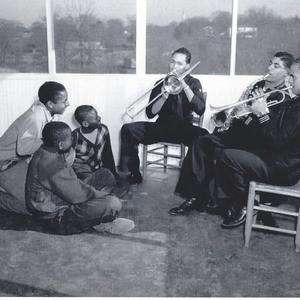Work and Labor
Working at the University has been a source of pride and resentment for Northside neighbors who built the early dorms, hospital, South Building, laid the brick walkways, hauled washing water from the “old well” to students in Old East, did copious amounts of laundry 7 days/week for $14 (which could go up to as much as twice that with the grueling “piecework” or pay-by-the-piece that came in with so-called liberal labor policies in the early 1940s), and continue to maintain its grounds and facilities. As Rebecca Clark has so pointedly said, “we were doing then what we were taught to do, work for a dollar.”
Neighbors also organized their labor power. Kennon Cheek, George Washington, and others founded the University’s first union, the Janitorial Association, which fought for and won the right to work for up to 56 hours per week and a one-week “vacation” benefit. They joined in the efforts of the CIO to form Local 403, the regional chapter of the new State County and Municipal Workers Association (SCMWA) in 1930. They struck against the treatment of food service workers, setting the ground for the Housekeepers Association in 1991 and its movement for fair wages and working conditions. When federal funding required UNC hospitals to diversify its staff in the early 1970s, women especially found new opportunities in nursing, medical technologies, and administration, and created an informal network of care across a hospital setting that had, until just a few years earlier, refused access to Black patients.
And many led distinguished careers. Robert Revels founded the first Mechanics Shop. Velma Perry supervised maintenance at the Carolina Inn. For 35 years, Belinda Caldwell was the “Voice of Carolina” at UNC’s switchboard. From her post in the office of the Dean of the UNC Law School, 1975 to 2003, Ms. Esphur Foster supported and schooled many of the region’s most prominent attorneys. Keith Edwards was UNC’s first Black female police officer. Professor Charlene Regester continues to teach in the Department of African, African-American,and Diaspora Studies.
But it’s a mistake to identify Northside too closely with the University. Doing so can perpetuate liberal myths of dependency and distract from the vibrant economy residents built within and beyond the neighborhoods.
Northside residents like R.D, Smith, Catharyn Butler, and Freda Andrews have always been revered teachers. The great tradition of music education at Lincoln High produced artists like Bubba Norwood and Prince Taylor. Artisans like Ezra Barbee and William “Smitty” Smith continue to be some of the most sought after masons in the area. Black entrepreneurs created hotel, food, and entertainment venues. Neighbors still run small farms, direct funeral homes, keep barber shops, and lead churches, civic/social organizations, and non-profits. Men didn’t always come out of the Army or Navy with the same new skills as their white brothers-in-arms but they turned what experience they had into careers as cooks, mechanics, and police officers. As Senator Val Foushee points out, the church gave its youth a second education in public speaking and political life—and set an abiding model for service in ministry (Morris Hogan/timeline, Heavenly Groceries, Rev H) and municipality (Wilson Caldwell/timeline, Howard Lee, Fred Battle, Nate Davis,Hilliard Caldwell)--or both. Across the board, residents hail the wealth of neighborhoods steeped in traditions of care, mentorship, apprenticeship, and self-sufficiency—even when the dollars didn’t always match up. As Raney Norwood reminds us,”If you called me poor, even back then, I couldn’t find anywhere for that word to fit in our vocabulary. My brother and I, when we sit down and talk now, we feel rich.”




